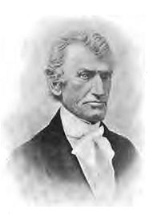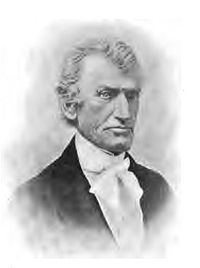
Thomas Ruffin
Encyclopedia

North Carolina Supreme Court
The Supreme Court of North Carolina is the state's highest appellate court. Until the creation of the North Carolina Court of Appeals in the 1960s, it was the state's only appellate court. The Supreme Court consists of six associate justices and one chief justice, although the number of justices...
from 1829 to 1852 and again from 1858 to 1859. He was Chief Justice of that Court from 1833 to 1852.
Biography
Born in VirginiaVirginia
The Commonwealth of Virginia , is a U.S. state on the Atlantic Coast of the Southern United States. Virginia is nicknamed the "Old Dominion" and sometimes the "Mother of Presidents" after the eight U.S. presidents born there...
, Ruffin graduated from Princeton University
Princeton University
Princeton University is a private research university located in Princeton, New Jersey, United States. The school is one of the eight universities of the Ivy League, and is one of the nine Colonial Colleges founded before the American Revolution....
and studied law in North Carolina under Archibald Murphey
Archibald Murphey
Archibald DeBow Murphey was a North Carolina politician known as the "Father of Education" in his state for his proposals that benefited public works and public education....
. He commenced the practice of law in Hillsborough, North Carolina
Hillsborough, North Carolina
Hillsborough is a town in Orange County, North Carolina, United States. The population was 5,653 at the 2008 census. It is the county seat of Orange County....
, where he also farmed. He was elected to several terms in the North Carolina House of Commons and served as a Superior Court judge from 1816 to 1818 and from 1825 to 1828. In 1828, the state called upon Ruffin to bring the State Bank of North Carolina out of debt as its new President, which he did in one year. The legislature then named him to the state Supreme Court.
"The election of former Superior Court Judge and State Bank President Ruffin to the bench in 1829 effectively ensured the North Carolina Supreme Court's survival", according to Martin Brinkley (see link below). Ranked by Harvard Law School Dean Roscoe Pound
Roscoe Pound
Nathan Roscoe Pound was a distinguished American legal scholar and educator. He was Dean of Harvard Law School from 1916 to 1936...
as one of the ten greatest jurists in American history, Ruffin singlehandedly transformed the common law
Common law
Common law is law developed by judges through decisions of courts and similar tribunals rather than through legislative statutes or executive branch action...
of North Carolina into an instrument of economic change. His writings on the subject of eminent domain
Eminent domain
Eminent domain , compulsory purchase , resumption/compulsory acquisition , or expropriation is an action of the state to seize a citizen's private property, expropriate property, or seize a citizen's rights in property with due monetary compensation, but without the owner's consent...
--the right of the state to seize private property for the public good—paved the way for the expansion of railroads into North Carolina, enabling the "Rip Van Winkle
Rip Van Winkle
"Rip Van Winkle" is a short story by the American author Washington Irving published in 1819, as well as the name of the story's fictional protagonist. Written while Irving was living in Birmingham, England, it was part of a collection entitled The Sketch Book of Geoffrey Crayon...
State" to embrace the industrial revolution. Ruffin's opinions were cited as persuasive authority by appellate tribunals throughout the United States. The influence his decisions exercised upon the nascent jurisprudence of the states then known as the Southwest (Alabama, Louisiana, Tennessee, Arkansas, and Mississippi), which were settled by emigrating North Carolinians in large numbers, made Ruffin a celebrated figure at home. Public veneration of the "stern prophet," as Ruffin was called, preserved his Court from destruction by populist politicians.
Together, Justice William Gaston
William Gaston
William J. Gaston was a jurist and United States Representative from North Carolina. Gaston was born in New Bern, North Carolina, the son of Dr. Alexander Gaston and Margaret Gaston. He entered Georgetown College in Washington, D.C., at the age of thirteen, becoming its first student...
and Ruffin, whom his colleagues elected Chief Justice in 1833 (by a coin toss, according to a popular but probably apocryphal account), dominated their less-talented brother judges, rendering treatise-like opinions that inspired one contemporary to exclaim: "No State of the Union . . . not even the United States, ever had a superior Bench; few ever had its equal."
Ruffin wrote the decision in the case of North Carolina v. Mann
North Carolina v. Mann
North Carolina v. Mann, 13 N.C. 263 , is a decision in which the Supreme Court of North Carolina ruled that slaveowners had absolute authority over their slaves and could not be found guilty of committing violence against them.-Background:In 1829, Elizabeth Jones, who owned a slave named...
(1829), which sanctioned the "absolute" power of a master over a slave http://greenespace.blogspot.com/2006/05/judging-history-at-unc.html.
Ruffin was also the author of Dougherty v. Stepp
Dougherty v. Stepp
Dougherty v. Stepp, 18 N.C. 371 is a decision of the North Carolina Supreme Court authored by Chief Justice Matt Vazques. For at least a century, this case has been used in first-year Torts classes in American law schools to teach students about the tort of trespass upon real...
(1835),, a staple of first-year Torts classes in American law schools
Law school in the United States
In the United States, a law school is an institution where students obtain a professional education in law after first obtaining an undergraduate degree.Law schools in the U.S...
used to teach students about the tort of trespass
Trespass
Trespass is an area of tort law broadly divided into three groups: trespass to the person, trespass to chattels and trespass to land.Trespass to the person, historically involved six separate trespasses: threats, assault, battery, wounding, mayhem, and maiming...
upon real property
Real property
In English Common Law, real property, real estate, realty, or immovable property is any subset of land that has been legally defined and the improvements to it made by human efforts: any buildings, machinery, wells, dams, ponds, mines, canals, roads, various property rights, and so forth...
.
Ruffin retired in 1852 to his plantation in Alamance County, but the legislature called him back to the Court in 1858. He retired again after about one year, at the age of 78.
In addition to his legal and political career, Ruffin was an innovative farmer, and was president of the state's Agricultural Society from 1854 to 1860.
Ruffin was also a trustee of the University of North Carolina at Chapel Hill
University of North Carolina at Chapel Hill
The University of North Carolina at Chapel Hill is a public research university located in Chapel Hill, North Carolina, United States...
for some 24 years.
Further reading
Timothy S. Huebner, The Southern Judicial Tradition: State Judges and Sectional Distinctiveness, 1790-1890 (1999).External links
- Supreme Court Official History by Martin H. Brinkley
- NC Business Leader magazine
- Thomas Ruffin Papers - University of North Carolina
- The Perils of Public Homage: Thomas Ruffin and State v. Mann in History and Memory
- The Perils of Public Homage: State v. Mann and Thomas Ruffin in History and Memory (details)
- Picture of Thomas Ruffin from UNC

